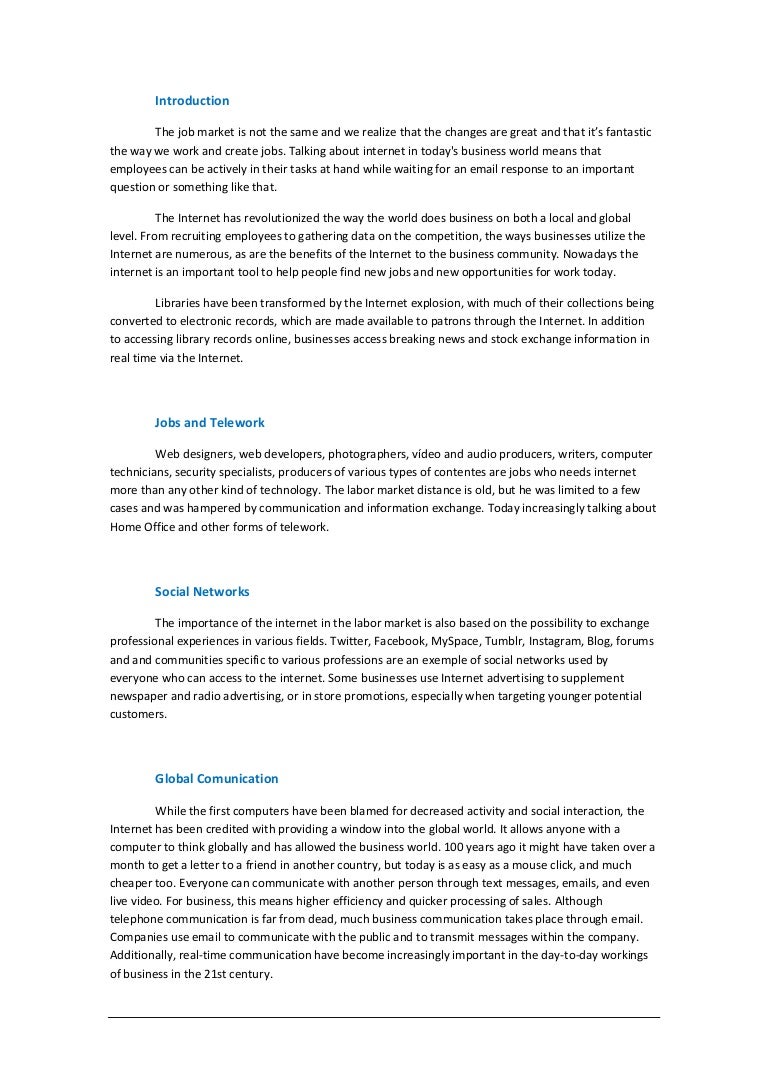Email has been a significant factor in all areas of the Internet, and that is certainly true in the development of protocol specifications, technical standards, and Internet engineering. The very early RFCs often presented a set of ideas developed by the researchers at one location to the rest of the community. The Internet is important for business development. Internet technology provides powerful communication and marketing tools. The Internet is a new Bazaar in which you can find online shops, online degree programs, and a lot more. You can browse various educational and business development websites, management service platforms anytime & anywhere. Secondly, I want you to know that you can start an online business from anywhere in the world; provided you have an internet connection. So whether you are in Philippines, Nigeria, USA, UK, Canada, India, etc; you will still find this information useful. Internet, a system architecture that has revolutionized communications and methods of commerce by allowing various computer networks around the world to interconnect. Sometimes referred to as a “network of networks,” the Internet emerged in the United States in the 1970s but did not become visible to the general public until the early 1990s.
- Information About Internet Of Things
- Significant Information About Internet And Business Online Banking
For most of history, the process of buying and selling remained about the same. Customers visited businesses in person to make purchases, and companies kept all of their stock stored locally. However, the advent of the internet drastically changed retail for both consumers and business owners. It affected the way shoppers and businesses interact because more and more purchases are made online without ever visiting a physical storefront. Even when customers do visit a store in person, it’s usually after completing research online first. According to BusinessZone, 62 percent of consumers say they browse online before making an in-store purchase. It can be difficult for stores with no online presence to keep up, with online retailers offering deep discounts, fast shipping and cost comparisons.
This trend toward online shopping shows no sign of slowing down. The U.S. Department of Commerce reports that web sales totaled $341.7 billion during 2015, an increase of 14.6 percent over 2014. This means that e-commerce accounted for more than 60 percent of total retail sales growth last year. For six years in a row, e-commerce sales have grown close to or exceeding 15 percent. Clearly, it has become critically important for small businesses to build a strong online marketing and e-commerce strategy.
Why Small Businesses Need E-commerce
Information About Internet Of Things
E-commerce strategies are important for businesses of all sizes, because consumers now have multiple channels at their disposal when they shop. Those who shop in store can take their business online and vice versa. However, many small businesses have outdated e-commerce sites. When customers use online research to find nearby locations and product availability, small businesses may lose out to larger companies if they don’t have a solid online presence. In addition, even consumers who prefer to shop in store can ultimately go the online route because it is the most convenient option. Inc. points out that data shows a “real value for businesses that embrace internet marketing and ecommerce to reach the large percentage of customers who are shopping online.”
E-commerce enables small businesses to keep pace with competitors while providing new sources of much-needed revenue as well. Because it’s relatively easy to set up an online store, small businesses really only need an internet connection to run various e-commerce solutions and a shipping process. Developing an e-commerce strategy may require less investment than opening a second brick-and-mortar location, Inc. says. E-commerce allows businesses to sell their products anywhere in the world rather than being restricted to the local area, so they stand to increase sales and profits. Even the smallest businesses can integrate e-commerce with their existing business website. The accessibility of online sales is ideal because it levels the playing field: Smaller operations can compete with large-scale sellers when they leverage e-commerce effectively.
Best E-commerce Platforms for Small Business
In the past, businesses that wanted to develop an online sales presence had to hire in-house web designers and developers to build out these services for them. However, this is no longer required. High-quality, user-friendly e-commerce solutions are readily available on the market. These platforms feature better scalability and functionality than some mid-sized companies have through their e-commerce sites, BusinessZone says. Even better, most providers offer a 14- or 30-day free trial, so you can try out different options and determine which is right for you. Many small companies utilize the same top solutions because they deliver the services and capabilities actual businesses of this size need.
The following are some of the best options available to help small businesses succeed in e-commerce. We sourced our list from this Entrepreneur article.
- Symphony Commerce: This e-commerce platform offers a software-as-a-service (SaaS) solution. It’s ideal because it off-loads the architecture and backend duties that are “critical to maintaining an online store.” This means that you can stay focused on core business processes. Symphony Commerce offers pay-as-you-go pricing, so it’s a great choice for a company that knows what it wants from an e-commerce service. If you are newer to online sales, you might want to go with a more one-size-fits-all option.
- Squarespace: This “fully loaded” platform is affordable and allows you to choose the perfect theme for your e-commerce site — no coding knowledge required. Squarespace enables you to upload as many items to your online store as you like, and it offers full control over inventory so that you can offer variants of the same product type with no hassle. However, this platform isn’t big on search engine optimization (SEO) or customer relationship management (CRM).
- Magento: Magento is one of the most scalable e-commerce platforms out there, meaning that you can add or subtract services to meet your specific needs. It is open source, so adding features is easy. It can be more complicated to use than many of these other picks, however, so it may be a little complex for first-time e-commerce retailers.
- CommerceHub: This cloud-based platform lets you increase the number of products you offer to customers. It “works as a merchandising and fulfillment platform that connects online retailers to suppliers” and allows for integration with any product source. Something important to note about CommerceHub is that it relies on businesses to have a developed sales funnel already, making it a good fit for companies that want to build on existing sourcing practices.
- Drupal Commerce: Drupal is the only e-commerce platform on this list that is built within an entire content management system, allowing users to customize workflow. It is very flexible, configurable and scalable. However, to get the most out of this option, you’ll probably need to hire an in-house developer to set up workflows and overall configuration, Entrepreneur notes. One thing that makes Drupal stand out is that it doesn’t come with licensing fees, which increases affordability.
- Shopify: This platform is an all-in-one solution that allows you to set up an online store. It’s one of the most popular e-commerce builders on the market. You can upload as many products as you like with close inventory control. Other valuable elements include a discount code engine and no transaction fees. Shopify comes with an app store. All of these customization options can be overwhelming, but Shopify doesn’t require a tech background to use.
As you can see, there are a wide variety of e-commerce platforms available on the market to help you create the online sales strategy that’s right for your resources and business goals. After identifying your requirements, you’ll be able to settle on a platform to build your online presence and stay competitive in the fast-paced world of e-commerce. Consumers are looking for quick, convenient shopping opportunities that make online the right choice for many. With more do-it-yourself e-commerce tools available than ever before, small businesses have the opportunity to capitalize on the online market with relatively low overhead. Cloud-based solutions make it possible to manage an online shop adeptly without wasting large amounts of time or resources.
If you are interested in topics like these that are relevant to business owners and entrepreneurs, consider Concordia University, St. Paul’s online MBA program. You can learn more about this responsive, relevant and real graduate business degree here.
Significant Information About Internet And Business Online Banking
Request More Info
Blog Categories
/no-cost-online-business-58a6434c3df78c345bae15ae.jpg)
Introduction
Worldwide influence of the internet is well-established and acknowledged. Penetration rate of the internet has been phenomenal; almost 1/3rd of Human population are accessing the internet. The way business is conducted in this digital age has changed due to so many people logged on to the internet.
Advancement in communication and information technology has further strengthen the role of the internet in business. The internet is widely used in organization for marketing and promotion of products and services. The internet is used to deliver customer support, share information and provide training to employees.
With the internet becoming a powerful tool for employees, the impact on business is undeniable.
Internet and Porter’s Five Force Model
Porter’s five force model is a framework for industry analysis, business strategy development and study competition. The five forces of the model are the threat from upcoming and future competition, threat from existing substitute, bargaining power of consumers, negotiating power of suppliers and threat of competition. Internet has great Impact on all five force of the model:
Threat of new entrants: The internet has considerably lowered entry barrier in setting up new enterprise. The setting up of a new company does not require much capital investment, for example, online retail sites, etc. Ever increasing competition has lowered the margins.
Threat of new substitute: The Internet has reduced the product life cycle; shelf life of products and encouraged innovation is customer serving.
Bargaining power of customers: The internet has made the customer well informed about products and available substitute. Companies have to be careful in presenting differentiation and pricing.
Bargaining power of suppliers: Suppliers are well informed about happening in the industry thanks to the internet.
Threat of competition: The internet has made transparency and honest important factor in success of the company. Customers tend to know more about the company. The internet has lowered the cost of searching new available products.
Internet and the way business is conducted
The internet has changed the face of business. It has opened up new avenues of conducting business. Below are some impacts of the internet on business:
Communication: communication technology combined with the internet has given a new dimension to connectivity and dispersion of information. Employees are in constant touch through email, instant messaging, office intranet, etc.
Collaboration: The internet has facilitated collaboration among employees of organization. Geographical boundaries no longer hamper project work and sharing of information.
Business Transaction: The internet has encouraged the culture of online business or e-commerce. In recent years many players have opened shops through e-commerce. Internet banking, payment gateways, etc. are part of normal supply chain transaction.
Work Flexibility: The internet has enabled workers to log in from remote location and home. It has helped on the move employees by remaining in touch with happenings of work.
Web based application: The internet has facilitated the development of concept like cloud computing, which has enabled process and storing of data in large proportion. The internet has helped reduce infrastructure cost of the company.
The internet thus has made a big impact in the way the business gets conducted in both positive as well as a negative way. The internet has made many business obsolete example post offices. Online security issues like hacking, identity theft, etc. are a constant threat to internet users.


| ❮ Previous Article | Next Article ❯ |

Authorship/Referencing - About the Author(s)
